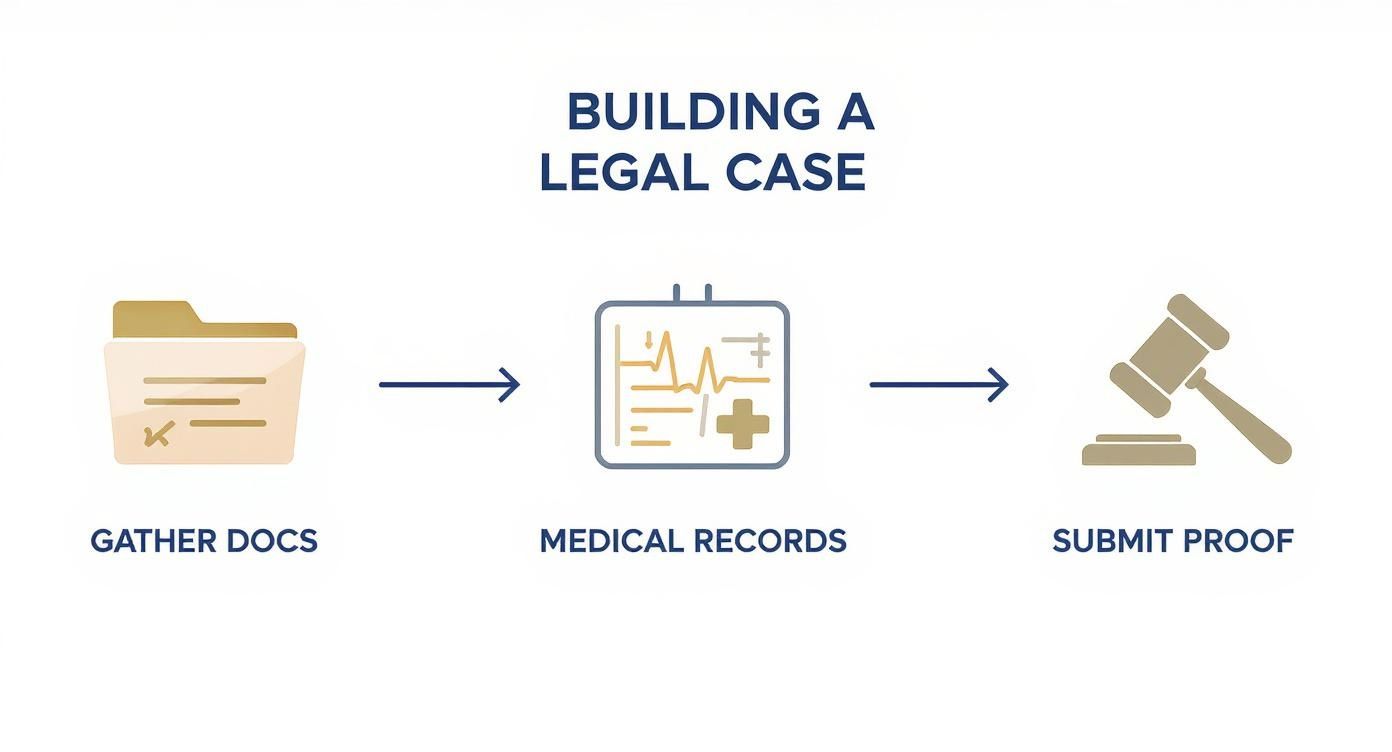Short Term Disability Lawyer Toronto - Get Legal Help Now
That letter from your insurance company, the one denying your Short-Term Disability (STD) claim, can feel like a punch to the gut. It’s a hugely stressful moment when you should be focusing entirely on your health. But this is not the end of the line—far from it. You have every right to fight the decision, and the first person you should speak with is a specialized short term disability lawyer in Toronto.
What to Do After an STD Claim Denial in Toronto

When you open that denial letter, it’s easy to feel defeated. I’ve seen it countless times with clients across the Greater Toronto Area, from Scarborough to Etobicoke; they assume the insurance company’s decision is the final word on their medical condition. That’s almost never the case. Insurance companies are businesses, and unfortunately, claim denials are a standard part of their operating model.
What you do next is absolutely critical. Your first instinct might be to get the insurance adjuster on the phone to plead your case or to quickly file the internal appeal they’ve offered. Resist that urge. Taking the wrong step now can actually weaken your position down the road.
Instead, just take a breath. It’s time to get organized.
Your First Steps Matter
Start by gathering every single piece of paper and every email related to your claim. Don’t leave anything out. This includes:
- The official denial letter, which will list their reasons for the rejection.
- A copy of your original application and all the medical records you sent in.
- Any emails, letters, or notes you made during phone calls with the insurer.
This collection of documents is the bedrock of a strong appeal. It gives a legal expert the evidence they need to poke holes in the insurer’s logic and build a solid case on your behalf.
While your focus is on STD, it’s worth noting that the core principles often overlap with other insurance disputes. Understanding general strategies to fight a denied insurance claim can provide valuable context. Likewise, the hurdles you’re facing now can be a preview of what’s to come if you need to transition to long-term benefits, so it’s wise to know what happens when a long-term disability claim is denied.
Here in Ontario, insurers are notoriously strict. They demand extensive medical proof and rigid adherence to treatment plans. Many denials are based on flimsy reasons, like “insufficient medical documentation” or a suggestion that you aren’t following your doctor’s orders, even when you’re doing everything you can. This is where having an experienced professional in your corner makes all the difference.
Why Do Insurers Deny Short-Term Disability Claims in Toronto?
When your short-term disability (STD) claim gets rejected, it’s easy to take it personally. But here’s something I’ve learned from years of handling these cases: it’s almost never about you. It’s a business decision.
Insurance companies are just that—companies. Their goal is to minimize payouts, and they have a well-oiled process for doing so. A denial is often just their opening move, not the final say on your claim.
They tend to lean on a handful of common reasons to justify a denial. Let’s say an office worker in Toronto’s Financial District files a claim for debilitating burnout and anxiety. Even with a detailed report from their psychiatrist, the insurer might send back a letter stating there is “insufficient objective medical evidence.” What they’re really doing is challenging the professional opinion of your own doctor.
Common Tactics Insurers Use
Another go-to strategy involves their own team of medical consultants. Imagine a construction worker from Mississauga provides clear, documented proof of a severe back injury from his family physician. The insurance company can have one of their in-house doctors—someone who has never met or examined the worker—review the file and conclude the injury is “not disabling enough” to keep him from his job.
These are calculated moves, plain and simple. They’re designed to frustrate you, hoping you’ll just give up. This often leads to frustrating delays or your benefits being cut off prematurely, even when your own doctor insists you cannot return to work. From healthcare and education to the trades, workers across Toronto run into these walls every single day.
A denial letter is designed to feel like the end of the road. Insurers are banking on the fact that most people won’t fight back, a strategy that saves them millions. This is precisely why having a short term disability lawyer in Toronto is so critical; they know these tactics inside and out.
Realizing that the system has these built-in challenges is the first step. You can get a much clearer picture by reading this detailed breakdown of how short-term disability in Ontario is explained. Your situation isn’t an isolated case, and that initial “no” from the insurer says nothing about the true strength of your claim.
How to Choose the Right Toronto Disability Lawyer

Choosing your legal partner is probably the most critical decision you’ll make when your disability benefits have been denied. It’s a tough spot to be in, and the reality is that not all lawyers are equipped to go toe-to-toe with massive insurance companies and win. You need a short term disability lawyer in Toronto who has a proven history in this specific, complex area of Ontario law.
This means you should look past the general-practice law firms. The right advocate is someone who deals with disability law day in and day out. They know the playbook insurance companies use to deny claims and have built connections with medical experts throughout the GTA—from specialists at Mount Sinai Hospital to local clinicians in Vaughan—who can provide crucial support for your case.
Key Qualities to Look For
As you begin your search, zero in on lawyers who can prove their expertise in this niche. Experience is everything here because insurers often hide behind confusing policy language and medical jargon to justify a denial.
Here’s what you should be looking for:
- A Dedicated Disability Focus: Does their practice revolve around disability claims, or is it just one small part of what they do? A specialist will always have an edge.
- Local Toronto Knowledge: A lawyer who knows the local medical community and the Ontario Superior Court of Justice system in the Greater Toronto Area brings a home-field advantage to your case.
- Contingency Fee Structure: You should never pay legal fees out of your own pocket. A reputable disability lawyer works on a contingency basis—they only collect a fee if they successfully win your case.
This kind of focused experience can be a game-changer. Across Toronto and Ontario, specialist short-term disability lawyers have been instrumental in getting benefits for thousands of workers. For instance, some dedicated firms have helped over 9,000 Canadians win their short-term disability claims over the past three and a half decades.
Critical Questions for Your Consultation
Think of the initial consultation as an interview where you are the one hiring. This is your chance to really assess the lawyer and see if they’re the right person to fight for you. Never hesitate to ask direct, pointed questions about their track record and their plan for your case.
A good lawyer will welcome your questions and provide clear, honest answers. If you feel rushed, dismissed, or confused during the consultation, that’s a major red flag. Trust your instincts.
To make the most of this meeting, prepare a list of questions ahead of time. This is your opportunity to understand their strategy and get a feel for how they would handle your specific circumstances. Our guide on what to look for when finding a disability lawyer near you has more great tips for this crucial step. These questions will help you choose with confidence.
Comparing Short Term Disability Lawyers in Toronto
Use this checklist to evaluate potential lawyers during your initial consultations to find the best fit for your case.
| Evaluation Criteria | Lawyer A | Lawyer B | Lawyer C |
|---|---|---|---|
| Specializes in Disability Law? | ☐ Yes ☐ No | ☐ Yes ☐ No | ☐ Yes ☐ No |
| Years of Experience with STD Claims? | |||
| Operates on Contingency? | ☐ Yes ☐ No | ☐ Yes ☐ No | ☐ Yes ☐ No |
| Has a Clear Strategy for My Case? | ☐ Yes ☐ No | ☐ Yes ☐ No | ☐ Yes ☐ No |
| Communicates Clearly & Respectfully? | ☐ Yes ☐ No | ☐ Yes ☐ No | ☐ Yes ☐ No |
| Has positive client reviews/testimonials? | ☐ Yes ☐ No | ☐ Yes ☐ No | ☐ Yes ☐ No |
Taking the time to compare your options methodically will pay off. The goal is to find a partner you trust completely to handle your claim, allowing you to focus on your health and recovery.
Building Your Case with Your Lawyer
Once you’ve found the right Toronto lawyer, it’s time to roll up your sleeves and build a rock-solid case. This is where you and your legal counsel work together, turning your personal records into the backbone of your legal strategy. It isn’t just about handing over a stack of papers; it’s about methodically gathering the evidence needed to pick apart the insurance company’s denial.
Your lawyer will take the lead, of course, but your role in collecting the right documents is absolutely vital. Think of yourself as the chief archivist for your own story—the story of your disability and the insurer’s wrongful denial.
Getting Your Core Documents in Order
First things first, your lawyer will need the foundational paperwork. This is the stuff that proves your employment, confirms your insurance coverage, and officially states the insurer’s decision.
Here’s what you’ll need to pull together:
- The Denial Letter: This is priority number one. It lays out the insurer’s exact reasons for saying no, and it’s the map your lawyer will use to dismantle their argument.
- Your Employment Contract: This proves your eligibility for benefits by outlining the terms of your job.
- The Group Benefits Booklet: This is the rulebook. It contains the specific definition of “disability” according to your policy, and your entire case hinges on proving you meet that definition.
- All Communications: Don’t throw anything away. Every single email, letter, and note you’ve jotted down from phone calls with the insurer is a potential piece of evidence.
Pulling Together the Medical Evidence
Next up is the medical proof, which is really the heart and soul of your claim. This goes way beyond just submitting a single note from your doctor. A good lawyer will coordinate directly with your medical team—whether that’s a specialist at Sunnybrook Health Sciences Centre or your family GP in Mississauga—to build a complete and compelling medical narrative.
You’ll be gathering everything from clinical notes and lab results to MRI scans and specialist reports. The key is to get documentation that clearly explains how your condition prevents you from doing your job. You want to leave absolutely no doubt in the insurer’s mind.
A winning strategy is to counter every single point in the denial letter with clear, overwhelming evidence. Your lawyer will take this pile of proof and build an argument that shows you squarely meet your policy’s definition of disability, making it incredibly difficult for the insurer to defend their denial.
Putting together this proof is critical, whether you’re fighting for short-term benefits now or think you might need support down the road. It also helps to understand the bigger picture, including how different policies work, which is covered in resources like this guide to long-term disability insurance.
What to Expect from the Ontario Legal Process
Facing the legal system can feel like stepping into a whole new world, but understanding the road ahead can make the experience far less stressful. When your short term disability lawyer in Toronto decides it’s time to take legal action against the insurance company, a very specific, structured process kicks off under Ontario’s Rules of Civil Procedure.
It all starts with a Statement of Claim. This is the formal legal document your lawyer drafts and files with the Ontario Superior Court of Justice. It tells your story: what your disability is, why the insurer was wrong to deny your benefits, and exactly what you’re owed. Once filed, this document is officially “served” to the insurance company, and they have to respond with their side of the story in a document called a Statement of Defence.
The Discovery Phase
With the initial paperwork filed, your case moves into what’s known as the discovery phase. This is essentially a mandatory show-and-tell for both sides. You’ll be required to provide all your medical records and related documents, while the insurer has to hand over their complete file on your claim. This includes everything from their internal emails to the reports from doctors they hired to review your case.
This part of the process is crucial because it eliminates surprises down the road. It gives your lawyer a clear view of the insurer’s internal logic and helps pinpoint the weaknesses in their decision to deny you. Often, you’ll also participate in an “Examination for Discovery,” where the insurance company’s lawyer will ask you questions about your condition under oath. It sounds intense, but your lawyer will be right there with you to prepare you for it.
The infographic below breaks down the key evidence needed to build a strong foundation for your case.

As you can see, systematically pulling together all your documentation is absolutely fundamental to building a persuasive argument.
The good news? The overwhelming majority of disability lawsuits in Ontario—well over 90%—never see the inside of a courtroom. They’re almost always resolved through negotiation or mediation, often at dedicated resolution centres right here in downtown Toronto.
Mediation is a private, confidential meeting where a neutral professional, the mediator, helps you and the insurance company find common ground and reach a settlement. It’s typically the last major stop before a trial would begin, and it’s where most claims are successfully resolved. This entire journey falls under the umbrella of civil litigation, and you can learn more about the broader process by seeing what’s involved when you hire a civil litigation lawyer in Toronto.
Frequently Asked Questions About Toronto Short-Term Disability Claims
When you’re dealing with a health issue that’s keeping you from work, the last thing you need is a confusing and stressful claims process. We get a lot of questions from people across the GTA who are feeling lost. Let’s tackle some of the most common ones.
How Much Does a Disability Lawyer Cost?
This is often the first thing people ask, and it’s a completely valid concern. The good news is that nearly all experienced disability lawyers in Toronto operate on a contingency fee basis.
What does that mean for you? Simple: you don’t pay any legal fees upfront. Your lawyer only gets paid if they successfully win your case or secure a settlement for you. The fee is just a pre-determined percentage of the money they recover. This approach removes the financial risk, so you can focus on your health while they focus on your claim.
Can My Employer Fire Me for Going on Disability?
It’s a major source of anxiety for many, but the answer is a firm no. Your job is protected.
Ontario’s Human Rights Code makes it illegal for an employer to fire you or discriminate against you simply because you have a disability and need to take a medically-supported leave. They have a duty to accommodate you.
For many, the journey starts with overwhelming workplace stress. Resources like a practical guide to taking stress work leave can offer valuable initial steps, which sometimes lead to a formal disability claim.
What Happens When My Short-Term Benefits Run Out?
Short-term disability is, by its name, temporary. It’s a bridge. Coverage periods usually last anywhere from 15 to 52 weeks. If your condition prevents you from returning to work after that, you’ll need to transition to long-term disability (LTD).
Don’t wait until your STD benefits are about to end. The application process for LTD can be slow. You should start preparing and submitting your LTD application several weeks before your short-term coverage expires to avoid a stressful and financially damaging gap in your income.
An experienced Toronto disability lawyer can handle both your STD and LTD claims, making that transition much smoother. If the insurance company tries to deny your LTD claim—which is unfortunately common—your lawyer will already be prepared to fight back.
At UL Lawyers, we’ve seen how insurance companies can add to the stress of an already difficult situation. As a Burlington-based firm serving Toronto and the entire GTA, we understand the local challenges you face. If your claim has been denied, you need an advocate in your corner. Visit us at ullaw.ca or call us for a free, no-pressure consultation to discuss your case.
Related Resources
A Guide to the CPP Disability Calculator in Ontario
Continue reading A Guide to the CPP Disability Calculator in OntarioHow to Apply for Disability in Canada: A Practical Guide
Continue reading How to Apply for Disability in Canada: A Practical GuideNEED A LAWYER?
We are here 24/7 to address your case. You can speak with a lawyer to request a consultation.
905-744-8888GET STARTED WITH A FREE CONSULTATION
Why Choose UL Lawyers
- Decades of combined experience
- Millions recovered for our clients
- No fee unless we win your case
- 24/7 client support
- Personalized legal strategies